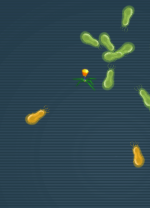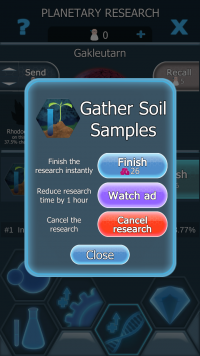Difference between revisions of "Research"
(→Default Droprates) |
(→Version History) |
||
| Line 108: | Line 108: | ||
=Version History= | =Version History= | ||
{{version history table}} | {{version history table}} | ||
| + | |||
| + | {{version history row | ||
| + | |v = 1.30.0 | ||
| + | |changes = | ||
| + | {{*}} It now costs {{bacteria}}500 to unlock [[Bacteria Evolution]] (previously {{bacteria}}10k) | ||
| + | }} | ||
{{version history row | {{version history row | ||
Revision as of 12:04, 27 July 2021
Research is a way of generating resources, earning and upgrading Evolved Bacteria, and improving Bacteria production.
Most research types require some amount of time to be completed and use Scientists, which are returned to the player after completion.
New research types can be unlocked by destroying planets.
Basics
Research Time
The base duration of a research action varies depending on the research type.
The research time can also be modified in various ways. The most notable one is upgrading your reduced research time stat, which will affect every action in the Research menu with the exception of Scientists travelling to and from planets. Other ways include paying Diamonds or watching ads to instantly complete one research action or completing Daily Quests and collecting Red Bacteria to reduce the remaining time for all active research actions.
Main page: Research Time
Cancelling Research
The option to cancel the research appears if you press and hold on an active research action.
Cancelling a research action will cause all the progress to go to waste and return the Scientists to the player.
Research Types
There are seven research types, all of which are unlocked by Planet 9, the only exception being Bacteria Irradiation.
Bacteria Irradiation is unlocked only after 5 planets past the first Black Hole.
Bacteria Evolution
Bacteria Evolution is the first research available in the game. There are seven types of Bacteria Evolution, which are unlocked as you destroy more planets.
Each Bacteria Evolution research type has a chance to discover one Level 1 Evolved Bacteria. The droprates of different rarity Bacteria depend on the selected research type.
Only one type of Bacteria Evolution can be researched at a time.
Default Droprates
Main page: Bacteria Evolution
Bacteria Engineering
Bacteria Engineering is a research type that allows you to upgrade the stats of an Evolved Bacteria by a random amount. Each Bacteria can be upgraded this way only once every level.
The maximum and minimum percentage by which a Bacteria can be improved depends on which Bacteria Engineering option you choose. This also influences the time and Scientists necessary to complete the process. Higher rarity and higher level Bacteria take longer to improve and require more Scientists.
Bacteria Engineering can be unlocked after destroying Mars.
Main page: Bacteria Engineering
Bacteria Mutations
The ability to mutate Evolved Bacteria is unlocked after destroying Mercury.
Mutation requires two Bacteria of equal level and always gives one Bacteria of a higher level as a reward. The rarity of the mutated Bacteria is the same as the rarity of the used Bacteria. If they are of different rarities, the mutated Bacteria will have a random rarity in the same range, so it is not possible to obtain a higher rarity Bacteria through mutation.
Mutation is instantaneous and it requires no Scientists. However, after it is complete, the player has to clean the lab before it can be again used for mutations.
The default mutation cap is Level 3, which can be raised to Level 4 with the Ultimate Life Form tech at the Dark Matter Institute. An additional mutation level can be unlocked after discovering all the Mythical rarity Evolved Bacteria in the Bacteria Collection. This brings the maximum level that an Evolved Bacteria can reach to 5.
See also: Evolved Bacteria
Main page: Bacteria Mutations
Colony Irradiation
Colony irradiation is unlocked after destroying Earth.
Successful irradiation doubles the production of a random colony. Unsuccessful irradiation yields some Bacteria. One colony can be irradiated multiple times.
It is only possible to irradiate colonies that you have purchased at least once before. If every colony has been purchased at least once, then each colony has the same probability of being irradiated. Irradiation is capped to 400 for each colony.
The irradiation effect is not lost when entering a Black Hole or attacking a planet.
Only one irradiation type can be researched at a time.
| Success rate | Duration | Scientists | |
|---|---|---|---|

|
10% | 01:00:00 | |

|
30% | 06:00:00 | |

|
50% | 12:00:00 | |

|
75% | 24:00:00 | |

|
100% | 24:00:00 | |

|
70% | 08:00:00 | |

|
100% | 06:00:00 |
Main page: Colony Irradiation
Nanobot Production
Nanobot production is unlocked after destroying 5 planets.

Only one Nanobot production type can be active at a time.
It's possible to instantly complete an active Nanobot production by paying some Diamonds.
The newly produced Nanobots appear on the main screen in real time. By clicking on a Nanobot, you gain an extra Nanobot for free, which is displayed as the Nanobot splitting into two yellow Nanobots.
The yellow Nanobots cannot be split any further.
Main page: Nanobots
Planetary Research
Planetary Research is a type of research that is unlocked after destroying six planets.
By sending a Scientist to the current planet, the player can gather soil samples that will give random bonuses until the current planet is destroyed. On certain planets, gathering soil samples also has a chance to yield Minerals that give permanent bonuses.
Soil samples can be gathered up to 5 times per planet and their effects are multiplicative.
After entering a Black Hole, the bonus from Planetary Research for the current planet is lost and the limit on gathering soil samples is reset.
In the Planetary Research Lab, only one action can be active at a time — either gathering soil samples or travelling to/from planets.
Main page: Planetary Research
Bacteria Recycling
Bacteria recycling lets you sacrifice unneeded Evolved Bacteria to obtain a random reward. It is unlocked after destroying the 9th planet - Xutrutis.
Upon recycling a Bacteria, 9 to 25 cards appear on the screen.
When a card is selected, it flips over, revealing the reward. After the first reward is received, the player can select up to one additional card from the remaining set by paying ![]() 5
5
The recycling rewards are divided into four tiers with each tier consisting of up to seven different rewards. The possible reward tiers and the number of cards displayed are determined by the bacteria value coefficient (BVC). The recycling rewards in events can be different from the regular game.
Bacteria Recycling is the only Research Lab that doesn't directly require Scientists.
Main page: Bacteria Recycling
Bacteria Irradiation
Bacteria irradiation is unlocked when the player has destroyed five planets after the first Black Hole.
Irradiation can increase the Black Hole Survival Probability of one selected Evolved Bacteria.
The default survival probability cap is 30%.
It can be raised to 100% by researching Hazard Elimination and other technologies at the Dark Matter Institute.
| Type | Effect | Duration | Scientists |
|---|---|---|---|
| Standard Dosage | 1:00:00 | ||
| High Dosage | 6:00:00 | ||
| Unstable Dosage | 3:00:00 | ||
| Overdosage | 2:00:00 |
Main page: Bacteria Irradiation
Version History
| Version | Changes |
|---|---|
| 1.30.0 | • It now costs |
| 1.19.0 | • Added Bacteria Engineering • Some research types can now be sped up by tapping on the canisters in the research menu |
| 1.15.0 | • Unlocking a new research type now also costs Bacteria |
| 1.3.0 | • Added Bacteria Recycling |
Related Pages
- Bacteria Evolution
- Bacteria Irradiation
- Bacteria Mutations
- Bacteria Recycling
- Colony Irradiation
- Evolved Bacteria
- Nanobots
- Planetary Research
- Reduced Research Time
- Research Time
- Resources
- Scientists




















